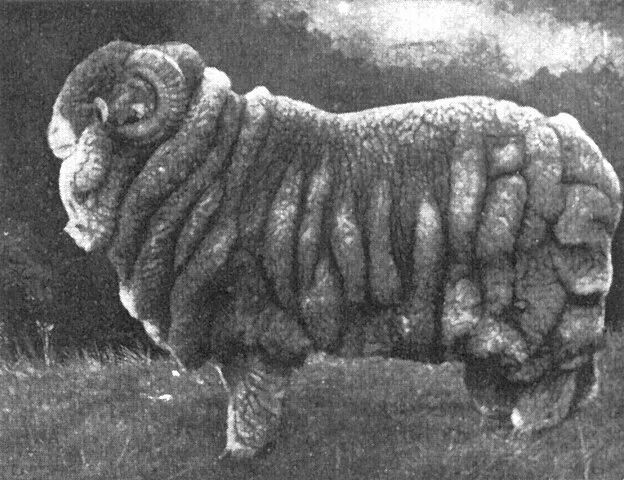I have written several posts about my quest for better boots, but I have also been trying to upgrade the rest of my wardrobe, too. Winter cold makes me ache, and cheap cotton clothing does not keep me warm, so I finally decided to bite the bullet and take advantage of some end-of-season sales to buy some Merino wool clothing.

Source
Merino wool
Merino wool is now produced globally, especially in the USA, Australia, and Germany, but originated centuries ago on the Iberian peninsula where it was initially maintained as a Spanish monopoly. The Merino sheep produces an exceptionally fine wool fiber, and this results in none of the characteristic coarseness and itchiness typically associated with cheaper wool.
Wool is an excellent insulating material. Even when wet from perspiration or precipitation, it loses little warmth. It dries reasonably quickly, too. This makes it an excellent cold weather base layer, where it competes with modern synthetics. Unlike those synthetics, it is also fire resistant, so it does not melt and fuse to flesh when it contacts flame or heat. Cotton and linen lose insulation quickly with moisture, but this is advantageous in hot and dry conditions.
On an environmental analysis, wool is a biodegradable natural fiber. Most concerns come from flocks over-grazing land and releasing greenhouse gasses. However, sheep also leave behind manure and can be used to manage weeds like nature's automatic lawn mower. Animal welfare concerns tend to focus on harm from sheep shearing practices and a practice called mulesing. This process cuts away wool-bearing skin on a sheep's backside, resulting in scar tissue. However, the purpose is to reduce or eliminate incidence of flies laying parasitic larvae there. Yuck!
Socks
In my posts about shoes, I mentioned a preference for Wigwam brand Merino wool blend boot socks. They are made in the USA, and thus far have served well. There are other brands out there, and some may be better.
Not necessarily worse are the Lands' End Snow Pack Boot Socks. They seem to now be some kind of cross-promotion with country singer Blake Shelton, because last time I bought them, they didn't have any cheesy vinyl branding that quickly peeled off after being worn and laundered a time or two. Wait for sales, because the normal price is too high for what you get in my humble opinion, especially since it no doubt includes a celebrity tie-in markup.
Lands' End used to be a reputable brand. It was founded in 1963 as a yachting supply company in Chicago, and expanded to clothing, bedding, luggage, and furnishings. They were a popular mail-order company when I was younger. I think there was a decline after it was acquired by the now-defunct Sears corporation. They aren't bad now, per se, but there is often little to differentiate them from any other higher-end made-in-China product. Their canvas tote bags are still good, though.
Wool Tees
I haven't been anymore happy with the cotton undershirts I've been buying than I have been with my boots. Cheap prices mean cheap material and poor construction quality. Cotton also fails to keep me warm. It's not that cotton is a bad material, mind you. The cooling effect it provides when damp makes it a great option in hot weather. It doesn't melt like synthetics if it is exposed to heat, so it has long been favored as workwear. It is also soft and comfortable against the skin, but the rest of its attributes make it a poor performer in cold weather, especially when I am exerting myself. That is why I decided to try some Merino wool undershirts.
My first purchase was from Amazon. It was "imported." The site didn't say from where. Their AI assistant said Vietnam or Thailand. OK. I ordered it. The tag plainly said, "Made in P.R.C." Boo! However, the shirt performed as expected. Not only did it retain more warmth, but even when I worked up a sweat, it also didn't stink of body odor to the same level cotton does. Another benefit of wool is its natural inhibition of bacterial growth. This could be a major benefit to anyone on a hiking or camping trip. I'll have to test that this summer if possible.
With this in mind, I decided to make a bigger purchase, but not from China this time. As a history and firearm enthusiast, I follow Forgotten Weapons, and host Ian mentioned his merchandise store through Finnish supplier Varusteleka. This company sells military gear, surplus equipment, and their own brands including Särmä. I decided to bite the bullet and buy their 3-pack of Särmä wool t-shirts. These are only 80% Merino Wool with 20% Polyester blend, but they advertise these as made from mulesing-free wool in Lithuania. The sizing measurements they include are accurate, so just use a tape measure to double-check where you fall on their scale. All told, it seems a good value compared to other offerings elsewhere online.
Thermals
When really cold weather looms, the secret to staying warm is layering. A full base layer of long underwear, also called long johns or thermal underwear, is the foundation for such a system. It retains warm air near the body while wicking away sweat. The usual materials are usually synthetic, but merino wool is a higher-end option. Out-of-season sales make this almost an affordable option.
Like Lands' End, L.L. Bean is an old American company. It started way back in 1912 when Leon Leonwood Bean started making and selling his Bean Boot in Freeport, Maine. They're still made in Maine to this day, and you can watch the Rose Anvil review for more info. They aren't the boots I need here for day-to-day life in the Pacific Northwest, so I don't own any.
Also like Lands' End, L.L. Bean sells a multitude of other items nowadays. Their Cresta Wool midweight shirt and pants seem very well-made. The material is 100% Merino wool, and the stitching looks good inside and out, so as Chinesium goes, this is the high-grade stuff.
Today, L.L. Bean is more of a proper hiking and camping outfitter with a variety of products from reputable outside brands as well as their in-house products. Much is made overseas, but the quality control is solid. They also sell home goods like bedding, offer a line of tote bags, and plenty of fashionably casual sportswear if those are your thing. Their sale prices aren't as steeply discounted as Lands' End, but I think that can often indicate less of a markup on better products.

If you need performance clothing or just want to keep winter from chilling you to the bone, consider wool. It's one of the oldest textiles humans have used, and it remains useful today. Merino wool is soft, and with proper layering, coarser wool can add its advantages without the same cost. Blended fibers can also keep costs down, provided you don't strictly adhere to Leviticus 19:19.
Whether just wool or as a blend, the old adage "buy once, cry once" certainly can apply, because it isn't cheap. Buying quality will still generally offer benefits and potential savings in the long run. I consider it an investment, especially when inflation continually threatens to erode the value of my hard-earned government fiat funny money. Or am I just pulling the metaphorical wool over my eyes every time I literally put on one of these shirts? Chime in with your opinion.
